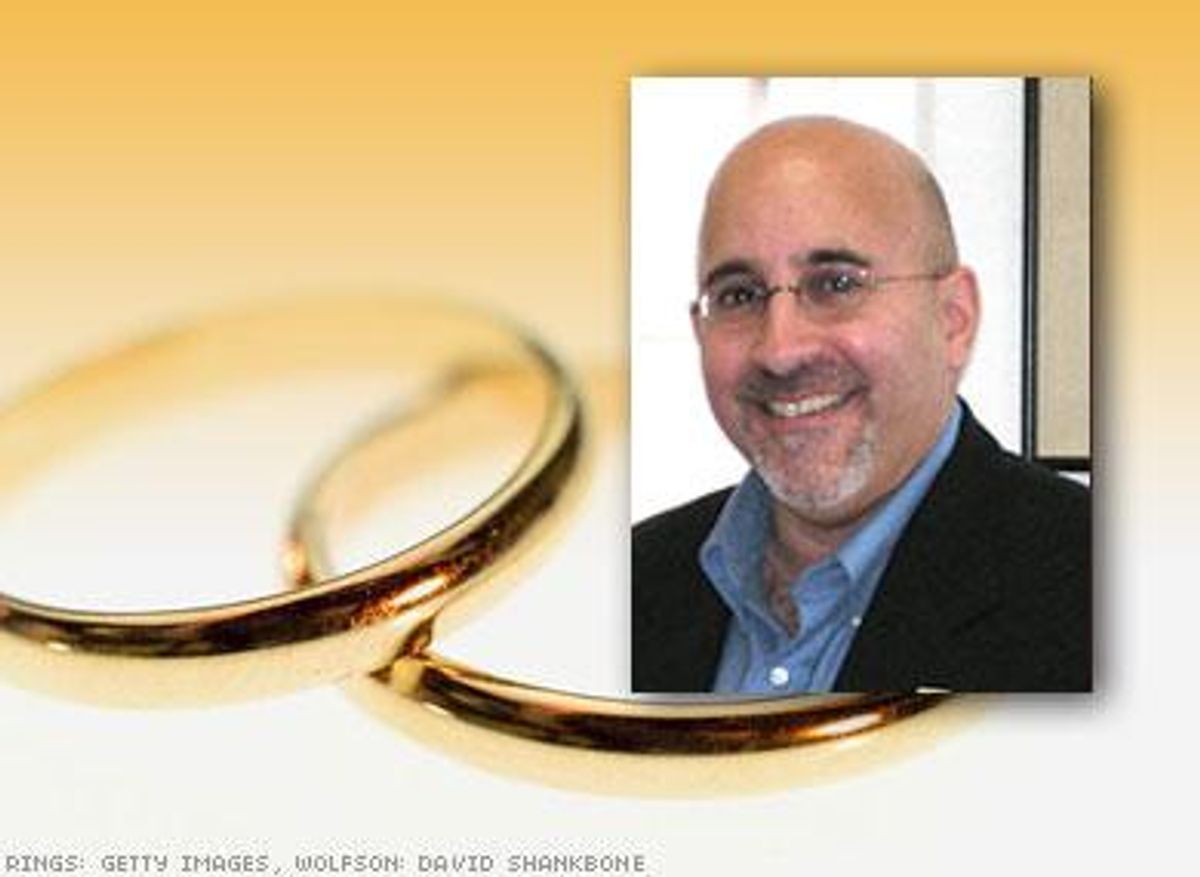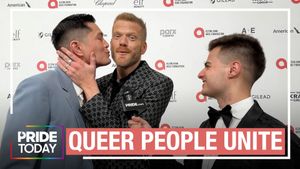The February 21 edition of TheNew York Timesfeatured an op-ed by writers Jonathan Rauch and David Blankenhorn attempting to forge a compromise on how the federal government should recognize same-sex unions. They suggest that Congress acknowledge statewide marriage laws, extending federal civil union status to marriages and civil unions that are lawful in specific states, so long as those states also extend protections to religious organizations that object, legally exempting any such organizations from participating in same-sex unions.
We asked three key people immersed in different aspects of the marriage-equality effort to weigh in on Rauch and Blankenhorn's reconciliation.
Evan Wolfson, executive director of Freedom to Marry
Although I trust these writers are sincere, this is a misdirected solution to a phony problem. In 2006, for example, David Blankenhorn, a self-proclaimed moderate, participated in a debate with me on C-SPAN , and then wrote a whole book regarding his opposition to our freedom to marry. That opposition had nothing to do with "religious exemptions" (an odd concept when it comes to who should be able to marry) or anything in this piece.
The core of the real opposition we face is not really about marriage -- it's about gay. The same forces against our freedom to marry are also against its products, which include civil union and partnership. We will never give enough ground to appease them, nor should we. Why take on the burden of inventing and then selling a second-class, cobbled-together, unworkable new system with all its headaches and intrinsic and complex flaws (including this op-ed's dangerous and wholly unnecessary religious carve-outs and complete withholding of marriage itself) -- instead of the system that exists, marriage -- just because gay couples are starting to participate? Why surrender the moral high ground we are successfully claiming -- with principle, persuasion, patience, and persistence -- for an illusory common ground when, as witness the most recent and vociferous rejection of even civil unions and any such half-measure by the so-called moderate new chair of the Republican Party, Michael Steele, this is a nonstarter.
So-called compromises such as this are just a distraction from the real work at hand to address the real problem: the need to end the "gay exception" to marriage and fair treatment of families. We should not allow opponents to divert us from engaging the reachable-but-not-yet-reached public in the resonant vocabulary of marriage, which, after all, is what is moving us forward (as the creation and greater embrace of civil union itself shows). Our advocates should stop bargaining against us, and help engage people on the merits, making the case for why marriage matters and why equality is the right answer.
Nicky Grist, executive director of the Alternatives to Marriage Project
Obviously, this compromise won't satisfy anyone who wants full social equality regardless of sexual orientation. Nor should it satisfy people who prioritize practicalities, such as taxation and access to health care. Marriage-equality campaigns shine a much-needed spotlight on the injustices caused by treating married and unmarried relationships differently. But it is wrong to think that same-sex marriage or civil union will solve these problems.
Let's assume that, after an initial rush of civil unions fulfill the pent-up demand among same-sex couples, the rate of union and divorce becomes the same for all couples regardless of gender (for ease, let's use the verb "union" to include all government-certified civil unions and marriages). Eventually, there will still be about as many un-unioned as unioned households in the United States, there will still be over 90 million un-unioned adults, and about one or two in every 10 un-unioned individuals will still be cohabiting with an intimate partner with whom, for a variety of reasons, they haven't unioned.
At that point, will it be any more fair that unioning raises or lowers your taxes? Will it be OK that people must union or divorce, or can't union, in order to get affordable health care? Will any more people exercise their rights around medical decision-making? Will there be any fewer green-card unions? Will judges know how to help un-unioned families divide their property after a breakup? Will caretakers who aren't unioned to their dependents get any relief? Will surviving dependents have any more access to benefits if they weren't unioned to their deceased providers? Will health clubs, travel agents, and employers stop basing rates and rewards on union status? Will parents let un-unioned partners share bedrooms?
No. This compromise should not satisfy anyone who is looking forward to the end of discrimination on the basis of marital or relationship status.
Jenny Pizer, National Marriage Project director for Lambda Legal
We do not think it's a good compromise at all. The heart of the issue is that we're talking about civil marriage and the fact that the government should be treating everyone equally in this civil institution. They would never suggest that the government disallow interfaith or interracial marriages -- or people who remarry after divorce -- just to accommodate some who oppose such unions on religious grounds.
The government shouldn't avoid this conflict and "compromise" by saying that a minority group that has been discriminated against and excluded for a long time should continue to be kept out of the system in order to accommodate the views of people who think this minority shouldn't have equal rights and should be segregated and subordinated. That idea is pernicious because of the resistance we face. If we're talking about the government, talking about the professional marketplace, there's a lot of areas of life that are secular. Religious organizations may be welcome to participate in the public marketplace, but they will have to participate by the same rules that everyone else has to follow. It's an enormous problem if we accept the idea that certain groups don't have to follow civil rights laws or any other laws.
David Blankenhorn is a right-wing ideologue who has a particular view that kids should only be born into man-woman relationships and that society is going to hell in a handbasket because heterosexual marriages are failing. Jonathan Rausch made a conservative argument for marriage. He's not grappling with the core problem that discrimination really hurts gay people, and it doesn't matter if there's a religious motive or a secular motive.
Everyone's entitled to hold onto their religious beliefs, but governing rules have to treat everyone as equal. This op-ed seeks to expand religious exceptions in terms of equality, with respect to the way that government treats people. The government must not be discriminating. And the main reason I object to this so vehemently is that what we saw in the Prop. 8 campaign is the pack of lies around the idea that marriage equality for gay and lesbian people necessarily brings attack on churches and religious leaders and religious institutions, and that's just not true. Religious figures do not have to perform any kinds of marriages for any couples they don't want to marry. They are absolutely legally exempted from doing that, and they're entitled to teach what they want to teach. But if they decide that they want to run a group home as a service of the state, and they decide to take in these kids who are wards of the state, then that's not a religious ritual. The fact that they may have a religious reason for wanting to provide that service is fine, but they still have to follow the rules. They have to be licensed by the state, and they cannot discriminate.














































































